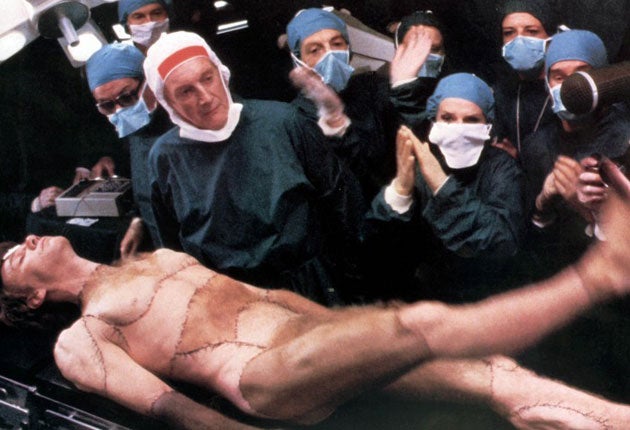Graham Crowden: Character actor whose work ranged from 'King Lear' to the sitcom 'Waiting for God'

Initially, Graham Crowden's idiosyncratic characterisations made him an actor ahead of his time, but as performing styles changed and strictures relaxed, the times came round to his way of thinking.
Born in 1922, he would easily have been old enough to adopt the more formal approach in vogue among many of his contemporaries. He certainly had the required equipment: a door-filling presence (he was 6ft 3in) and a commanding, resonant voice. It was first heard in an auditorium in his native Edinburgh when, as a small boy, he screamed in terror at the sight of Gerald Du Maurier's Captain Hook and had to be escorted from the theatre. While such a trauma might have kept many away from the stage for good, Crowden followed an undistinguished education and a truncated bout of military service by wholeheartedly embracing theatrical life.
However, those who thought him guilty of actorly affectation for walking with a cane were unaware that he did so with good reason. In 1942, while a lance-corporal, Crowden was shot, seriously wounded and invalided out of the army. Never one for molly-coddling, his mother responded by saying, "That fool should never have been trusted with a rifle." Privately though, she displayed more compassion, putting him to bed with the words, "See you in the morning", despite not expecting him to last the night. It became a family catchphrase, later taken up by Graham's wife and uttered to him every night for the rest of his life.
He first met Phyllida Hewat in rep at Pitlochry in 1950 where, in addition to acting, she was costume supervisor. Her first words to her future husband were, "What's your inside leg measurement?" The young player encouraged her to find out for herself by suggesting, "You hold the tape." They married two years later.
By then, the fledgling actor had started getting used to the directness of directors. Appearing as Le Beau in As You Like It at the Regent's Park Theatre, he had been abruptly informed by Robert Atkins that the character was "meant to be light, swift and mercurial. You are heavy, lugubrious and dull." It seems unlikely that he got the same note from Trevor Nunn when reprising the role for the RSC in 1978 (clad in bright pink with a red wig).
From the late 1950s Crowden seemed almost to specialise in originating stage roles, notably for NF Simpson in One Way Pendulum (1959) and for Tom Stoppard as the Player in Rosencrantz and Guildenstern Are Dead (1967). He was also the first to portray Mr Vincent Crummles, the "actor of no ordinary pretensions" in David Edgar's ground-breaking adaptation of Nicholas Nickleby, only coming out of the production to star in King Lear at the Bristol Old Vic. In his late 60s, Crowden proudly dubbed himself the juvenile lead in the Cottesloe Theatre's premiere of Jim Cartwright's Bed (1989) on the grounds that his fellow cast members would never see 70 again.
Alongside these plentiful live appearances, Crowden conducted equally busy careers on the screens, big and small. Lindsay Anderson cast him in three surreal and nightmarish movies between 1968 and 1982, If..., O Lucky Man! and Britannia Hospital. He also found favour with the Python alumni, featuring in Terry Gilliam's Jabberwocky (1977) and The Missionary (1982, written and co-produced by its star, Michael Palin) before inhabiting the character of Judge Hate in Didn't You Kill My Brother? (1987) for the next generation of subversive humorists, The Comic Strip.
Eccentricity had become such a staple of Crowden's casting that it was no surprise when BBC producer Barry Letts offered him the part of the fourth Doctor Who in 1974. Reluctant to be typecast and bound by a long-term contract, he declined and the job went to one of his agent's other clients, Tom Baker. It left him free for a range of television roles (including the sarcastic prison medic in Porridge) plus two long-running successes for which he is still remembered. A fan once told his daughter, the actress and writer Sarah Crowden, how much they had enjoyed her father's TV series. Sarah assumed the show in question was BBC1's peak-time sitcom Waiting For God (1990) but was delighted to hear they meant the often overlooked BBC2 gem A Very Peculiar Practice (1986).
After recovering from an accident while cycling with his wife on the car-free island of Sark, Crowden became impressively busy again, returning to the West End in And Then There Were None (2006), appearing in an episode of the TV series Foyle's War (2008) and making full use of his vocal range in radio dramas alongside the likes of Mark Gatiss, David Tennant and Brian Cox.
It was in a sound studio that I met him, a vast figure hunched in the corner, listening intently to the only recording of Sir Arthur Conan Doyle, whom he was about to play in a piece about the author's friendship with Houdini.
Taping began but despite having injected the right amount of Edinburgh into his portrayal, he was stopped after misreading a line. A second take saw the line delivered successfully, but Graham collapsed with laughter on realising he'd forgotten to do the accent.
Graham Crowden, actor: born Edinburgh 30 November 1922; married 1952 Phyllida Hewat (three daughters, one son); died 19 October 2010.
Join our commenting forum
Join thought-provoking conversations, follow other Independent readers and see their replies
Comments
Bookmark popover
Removed from bookmarks